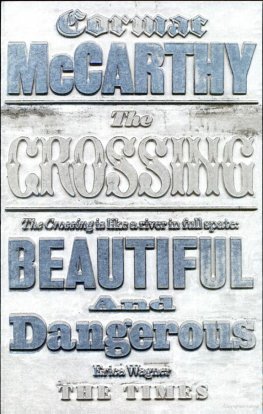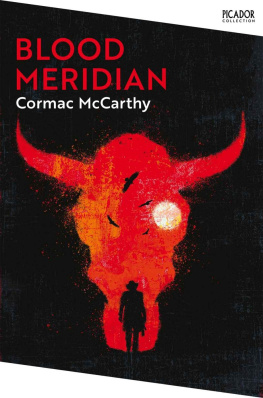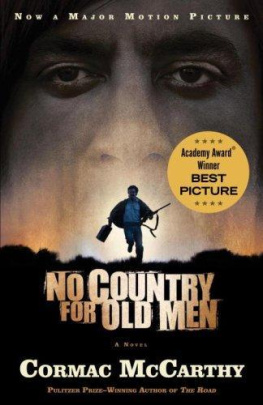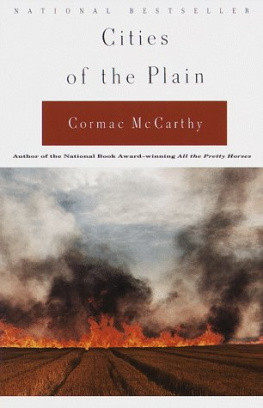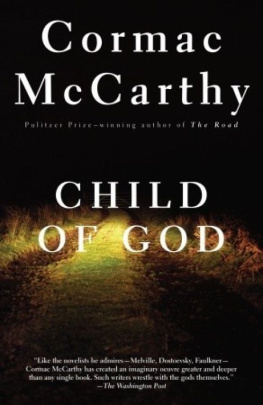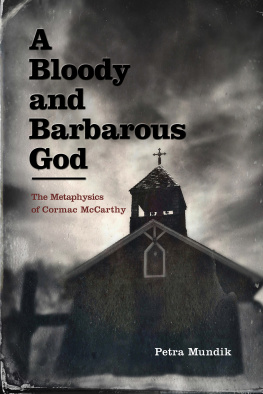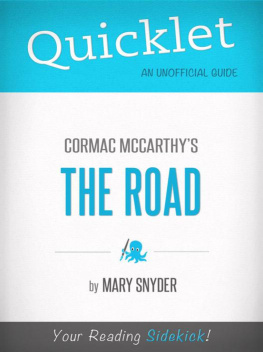Cormac McCarthy
The Crossing
Border Trilogy 2 The Crossing
WHEN THEY CAME SOUTH out of Grant County Boyd was not much more than a baby and the newly formed county they'd named Hidalgo was itself little older than the child. In the country they'd quit lay the bones of a sister and the bones of his maternal grandmother. The new country was rich and wild. You could ride clear toMexicoand not strike a crossfence. He carried Boyd before him in the bow of the saddle and named to him features of the landscape and birds and animals in both spanish and english. In the new house they slept in the room off the kitchen and he would lie awake at night and listen to his brother's breathing in the dark and he would whisper half aloud to him as he slept his plans for them and the life they would have.
On a winter's night in that first year he woke to hear wolves in the low hills to the west of the house and he knew that they would be coming out onto the plain in the new snow to run the antelope in the moonlight. He pulled his breeches off the footboard of the bed and got his shirt and his blanketlined duckingcoat and got his boots from under the bed and went out to the kitchen and dressed in the dark by the faint warmth of the stove and held the boots to the windowlight to pair them left and right and pulled them on and rose and went to the kitchen door and stepped out and closed the door behind him.
When he passed the barn the horses whimpered softly to him in the cold. The snow creaked under his boots and his breath smoked in the bluish light. An hour later he was crouched in the snow in the dry creekbed where he knew the wolves had been using by their tracks in the sand of the washes, by their tracks in the snow.
They were already out on the plain and when he crossed the gravel fan where the creek ran south into the valley he could see where they'd crossed before him. He went forward on knees and elbows with his hands pulled back into his sleeves to keep them out of the snow and when he reached the last of the small dark juniper trees where the broad valley ran under the Animas Peakshe crouched quietly to steady his breath and then raised himself slowly and looked out.
They were running on the plain harrying the antelope and the antelope moved like phantoms in the snow and circled and wheeled and the dry powder blew about them in the cold moonlight and their breath smoked palely in the cold as if they burned with some inner fire and the wolves twisted and turned and leapt in a silence such that they seemed of another world entire. They moved down the valley and turned and moved far out on the plain until they were the smallest of figures in that dim whiteness and then they disappeared.
He was very cold. He waited. It was very still. He could see by his breath how the wind lay and he watched his breath appear and vanish and appear and vanish constantly before him in the cold and he waited a long time. Then he saw them coming. Loping and twisting. Dancing. Tunneling their noses in the snow. Loping and running and rising by twos in a standing dance and running on again.
There were seven of them and they passed within twenty feet of where he lay. He could see their almond eyes in the moonlight. He could hear their breath. He could feel the presence of their knowing that was electric in the air. They bunched and nuzzled and licked one another. Then they stopped. They stood with their ears cocked. Some with one forefoot raised to their chest. They were looking at him. He did not breathe. They did not breathe. They stood. Then they turned and quietly trotted on. When he got back to the house Boyd was awake but he didnt tell him where he'd been nor what he'd seen. He never told anybody.
The winter that Boyd turned fourteen the trees inhabiting the dry river bed were bare from early on and the sky was gray day after day and the trees were pale against it. A cold wind had come down from the north with the earth running under bare poles toward a reckoning whose ledgers would be drawn up and dated only long after all due claims had passed, such is this history. Among the pale cottonwoods with their limbs like bones and their trunks sloughing off the pale or green or darker bark clustered in the outer bend of the river bed below the house stood trees so massive that in the stand across the river was a sawed stump upon which in winters past herders had pitched a four by six foot canvas supply tent for the wooden floor it gave. Riding out for wood he watched his shadow and the shadow of the horse and travois cross those palings tree by tree. Boyd rode in the travois holding the axe as if he'd keep guard over the wood they'd gathered and he watched to the west with squinted eyes where the sun simmered in a dry red lake under the barren mountains and the antelope stepped and nodded among the cattle in silhouette upon the foreland plain.
They crossed through the dried leaves in the river bed and rode till they came to a tank or pothole in the river and he dismounted and watered the horse while Boyd walked the shore looking for muskrat sign. The Indian Boyd passed crouching on his heels did not even raise his eyes so that when he sensed him there and turned the Indian was looking at his belt and did not lift his eyes even then until he'd stopped altogether. He could have reached and touched him. The Indian squatting under a thin stand of carrizo cane and not even hidden and yet Boyd had not seen him. He was holding across his knees an old singleshot 32 rimfire rifle and he had been waiting in the dusk for something to come to water for him to kill. He looked into the eyes of the boy. The boy into his. Eyes so dark they seemed all pupil. Eyes in which the sun was setting. In which the child stood beside the sun.
He had not known that you could see yourself in others' eyes nor see therein such things as suns. He stood twinned in those dark wells with hair so pale, so thin and strange, the selfsame child. As if it were some cognate child to him that had been lost who now stood windowed away in another world where the red sun sank eternally. As if it were a maze where these orphans of his heart had miswandered in their journey in life and so arrived at last beyond the wall of that antique gaze from whence there could be no way back forever.
From where he stood he could not see his brother or the horse. He could see the slow rings moving out over the water where the horse stood drinking beyond the stand of cane and he could see the slight flex of the muscle beneath the skin of the indian's lean and hairless jaw.
The indian turned and looked at the tank. The only sound was the dripping of water from the horse's raised muzzle. He looked at the boy.
You little son of a bitch, he said.
I aint done nothin.
Who's that with you?
My brother.
How old's he?
Sixteen.
The indian stood up. He stood immediately and without effort and looked across the tank where Billy stood holding the horse and then he looked at Boyd again. He wore an old tattered blanketcoat and an old greasy Stetson with the crown belled out and his boots were mended with wire.
What are you all doin out here?
Gettin wood.
You got anything to eat?
No.
Where you live at?
The boy hesitated.
I asked you where you lived at.
He gestured downriver.
Haw far?
I dont know.
You little son of a bitch.
He put the rifle over his shoulder and walked out down the shore of the tank and stood looking across at the horse and at Billy.
Howdy, said Billy.
The Indian spat. Spooked everthing in the country, aint you? he said.
We didnt know there was anybody here.
You aint got nothin to eat?
No sir.
Where you live at?
About two miles down the river.
You got anything to eat at your house?

